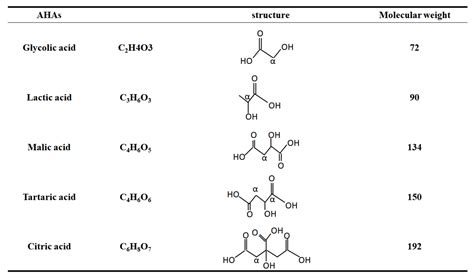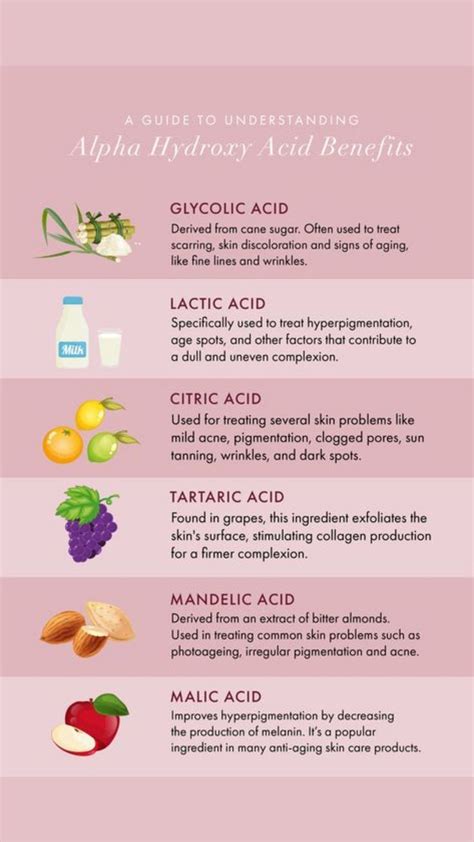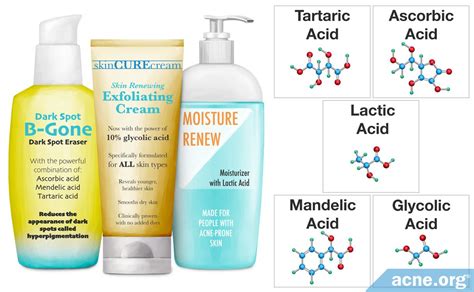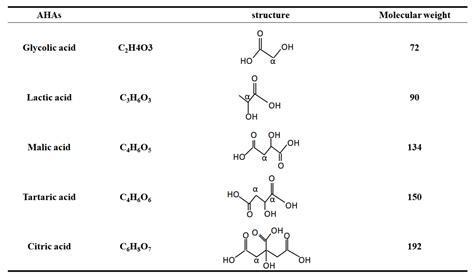Intro
Unlock Alpha Hydroxy Acids benefits, including skin brightening, anti-aging, and hyperpigmentation reduction, with natural exfoliants like glycolic and lactic acid, promoting cell turnover and collagen production for smoother, radiant skin.
The world of skincare is vast and ever-evolving, with new ingredients and products emerging every day. Among the numerous skincare ingredients, Alpha Hydroxy Acids (AHAs) have gained significant attention for their remarkable benefits. AHAs are a group of naturally occurring compounds found in various foods, such as fruits, milk, and plants. They have been used for centuries in traditional medicine and skincare practices, and their popularity endures due to their effectiveness in addressing various skin concerns. In this article, we will delve into the benefits of Alpha Hydroxy Acids, their working mechanisms, and how to incorporate them into your skincare routine.
AHAs are known for their ability to exfoliate the skin, removing dead skin cells and revealing brighter, smoother skin. This is achieved through their ability to break down the "glue" that holds dead skin cells together, allowing for a more efficient removal of these cells. As a result, AHAs can help improve skin texture, reduce the appearance of fine lines and wrinkles, and enhance skin radiance. Moreover, AHAs have been shown to stimulate collagen production, which can lead to improved skin elasticity and firmness. With their numerous benefits, it's no wonder that AHAs have become a staple in many skincare routines.
The benefits of Alpha Hydroxy Acids extend beyond their exfoliating properties. They have also been shown to have a positive impact on skin hydration, as they can help improve the skin's natural barrier function. This can lead to reduced water loss and improved skin moisture levels, resulting in softer, more supple skin. Additionally, AHAs have been found to have anti-inflammatory properties, which can help soothe and calm irritated skin. With their ability to address various skin concerns, from hyperpigmentation to acne, it's clear that Alpha Hydroxy Acids are a versatile and effective skincare ingredient.
What are Alpha Hydroxy Acids?

Types of Alpha Hydroxy Acids
The different types of Alpha Hydroxy Acids vary in their molecular size, which affects their ability to penetrate the skin. Glycolic acid, for instance, has the smallest molecular size, allowing it to penetrate deep into the skin. Lactic acid, with its slightly larger molecular size, is more suitable for sensitive skin, as it is less likely to cause irritation. Malic acid and tartaric acid, with their larger molecular sizes, are often used in combination with other AHAs to enhance their benefits. Understanding the different types of AHAs and their properties can help you choose the most suitable AHA for your skin type and concerns.Benefits of Alpha Hydroxy Acids

How Alpha Hydroxy Acids Work
Alpha Hydroxy Acids work by breaking down the "glue" that holds dead skin cells together, allowing for a more efficient removal of these cells. This process, known as desquamation, helps to improve skin texture and tone, reducing the appearance of fine lines and wrinkles. AHAs also stimulate collagen production, which can lead to improved skin elasticity and firmness. Additionally, AHAs have been shown to improve skin hydration, as they can help improve the skin's natural barrier function, reducing water loss and improving skin moisture levels.Using Alpha Hydroxy Acids in Your Skincare Routine

Precautions and Side Effects
While Alpha Hydroxy Acids are generally considered safe, there are some precautions and side effects to be aware of. AHAs can be irritating, especially for sensitive skin, so it's essential to start with a low concentration and gradually increase as your skin becomes more tolerant. AHAs can also make your skin more sensitive to the sun, so it's crucial to use a broad-spectrum sunscreen with at least SPF 30 during the day. Some common side effects of AHAs include redness, itching, and stinging. If you experience any of these side effects, reduce the frequency of use or discontinue use altogether.Alpha Hydroxy Acids and Skin Types

Combining Alpha Hydroxy Acids with Other Skincare Ingredients
Alpha Hydroxy Acids can be combined with other skincare ingredients to enhance their benefits. Some popular combinations include: * AHAs and beta-hydroxy acids (BHAs): BHAs, such as salicylic acid, can help unclog pores and reduce acne, while AHAs can help exfoliate the skin and improve skin texture. * AHAs and retinol: Retinol, a derivative of vitamin A, can help stimulate collagen production and improve skin elasticity, while AHAs can help exfoliate the skin and improve skin texture. * AHAs and vitamin C: Vitamin C, a powerful antioxidant, can help brighten and even out skin tone, while AHAs can help exfoliate the skin and improve skin texture.Conclusion and Final Thoughts

What are Alpha Hydroxy Acids?
+Alpha Hydroxy Acids are a group of naturally occurring compounds that are commonly found in foods such as citrus fruits, apples, and grapes. They are also found in milk and plants, such as sugarcane and maple trees.
What are the benefits of Alpha Hydroxy Acids?
+The benefits of Alpha Hydroxy Acids include improved skin texture and tone, reduced appearance of fine lines and wrinkles, enhanced skin radiance and brightness, improved skin hydration, and soothing and calming irritated skin.
How do I use Alpha Hydroxy Acids in my skincare routine?
+To use Alpha Hydroxy Acids in your skincare routine, start with a low concentration and gradually increase as your skin becomes more tolerant. Choose an AHA that is suitable for your skin type and concerns, and use it consistently, ideally 2-3 times a week. Don't forget to moisturize after using AHAs to help lock in moisture.
